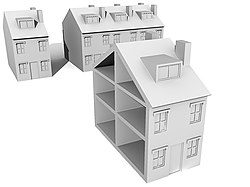The legal definition of real property is land, and anything growing on, affixed to, or built upon land. This also includes man-made buildings as well as crops. Real property is best characterized as property that doesn’t move, or that is attached to the land. This is in contrast to personal property, which can be moved or transferred physically.
The terms “real estate” and “real property” can be used interchangeably. Also, real property may include not just the land, but anything that is permanently located within or under the land. This may include oil, gases, and minerals found under the land. Another term used for real property is “premises”.
This article includes a list of general references, but it lacks sufficient corresponding inline citations. (October 2009) |
In English common law, real property, real estate, immovable property or, solely in the US and Canada, realty, is land which is the property of some person and all structures (also called improvements or fixtures) integrated with or affixed to the land, including crops, buildings, machinery, wells, dams, ponds, mines, canals, and roads, among other things. The term is historic, arising from the now-discontinued form of action, which distinguished between real property disputes and personal property disputes. Personal property, or personalty, was, and continues to be, all property that is not real property.
In countries with personal ownership of real property, civil law protects the status of real property in real-estate markets, where estate agents work in the market of buying and selling real estate. Scottish civil law calls real property "heritable property", and in French-based law, it is called immobilier ("immovable property").
English
Noun
real property (usually uncountable, plural real properties)
- (law) real estate.




